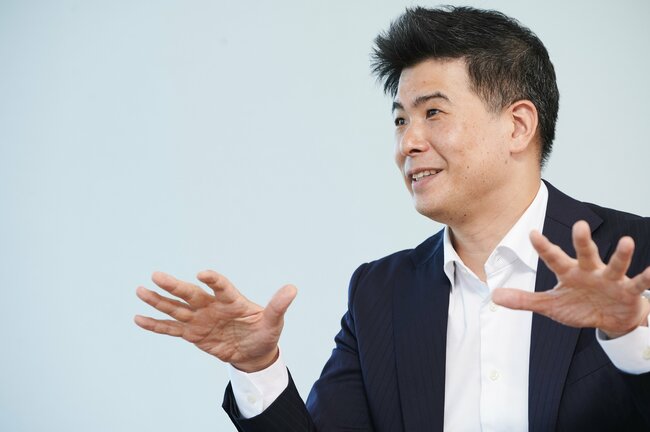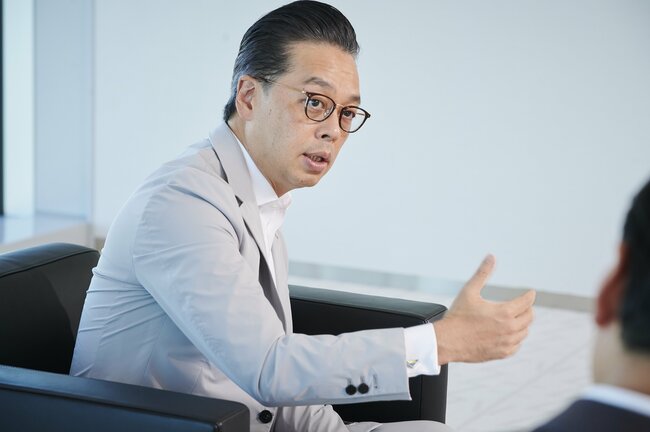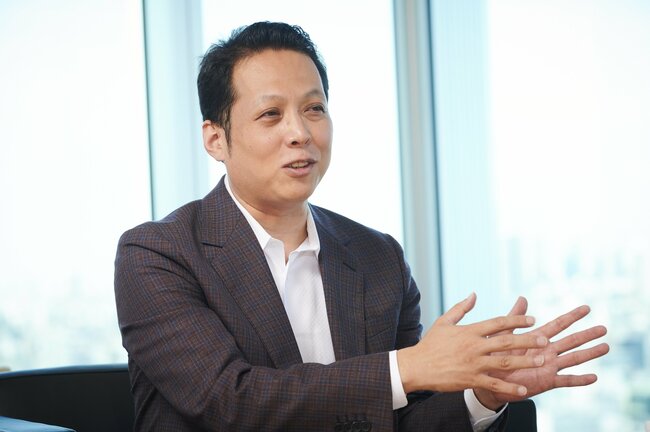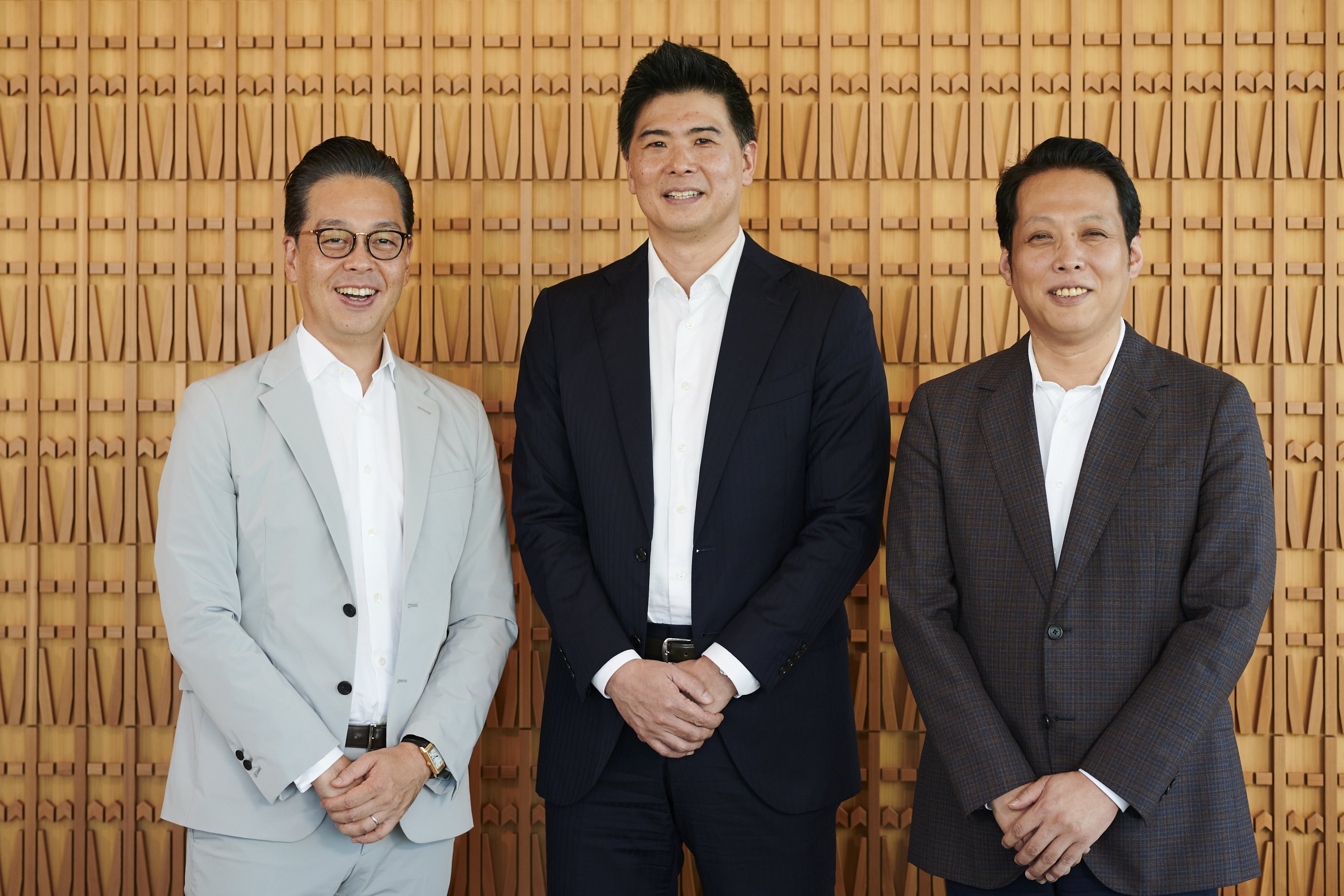Continuous learning drives motivation and performance
Nishigami:Could you give us a brief overview of your career history, Mr. Furuta?
Furuta:I started my career in finance, dealing with distressed assets and private equity investments. I attended many management meetings of our portfolio companies and advised them on tough decisions. However, I had never actually run a business by myself or led a large team, which felt contradictory.
I wanted to gain experience managing an organization, no matter the size. In particular, I hoped to work in manufacturing where I could contribute positively to society. Fortunately, this led me to join Takeda.
Nishigami:Manufacturing contains many fields, what attracted you to life sciences specifically?
Furuta:I don't have a life sciences background. However, Takeda has a full value chain from research to development, manufacturing, and commercialization. In other words, there are many points to add value as a business, so I thought there would be endless learning opportunities.
Nishigami:You mentioned learning as a keyword. What do you value in your work as a leader?
Furuta:Whether I am a leader or not, I value the opportunities to learn. This directly drives my motivation and I find my performance improves when I'm learning on the job.
I get more joy from discussing with colleagues and partners to gain new insights and create societal value than from relying on my accumulated experience.
Nagakawa:Leaders having an appetite for learning is so important. Some stop learning as they rise in their positions, but unless leaders have a flat attitude, learn from others, and continue to grow, leaders cannot survive today's fast-changing environment.
Was there something in particular that shaped your voracious learning leadership style?
Furuta:I joined Takeda and worked in the corporate office in Japan and Switzerland for several years before transferring to the Mexico commercial team at my request.
At the time, I knew little about Mexico, didn't speak Spanish, and had no commercial experience. Of around 800 employees, I was the least qualified for the job.
Lacking the required knowledge and experience myself, I had to rely on others' expertise to make decisions as the leader. This shaped my current leadership approach.
Nagakawa:When I was involved in a project as a consultant for your company, I was impressed by how you openly asked team members for input regardless of seniority or role. This creates an environment where everyone can speak freely and contribute more insights. However, not every leader has this capability, which is your strength.
Nishigami:How do you hope to evolve your leadership style going forward?
Furuta:I don't want to make decisions without recognizing objections and blind spots, so I aim to consult as many experts in and outside of the company as possible, and carefully weigh dissenting opinions. However, the time spent here trades off with decision-making speed, so I need to find the right balance.
 Milano Furuta
Milano FurutaPresident
Japan Pharma Business Unit
Takeda Pharmaceutical Company Limited
Going beyond medicines to help patients
Nishigami:Please share your perspective on Japan's current life sciences and healthcare landscape.
Furuta:Life sciences and healthcare are related but distinct. Science is borderless, but healthcare systems, regulations, and markets are highly localized.
Pharmaceutical companies have shifted from fully in-house drug development to diversifying discovery approaches in life sciences. Many innovative new drug seeds now come from academia and start-ups. It's crucial for pharma to access these innovations widely and quickly and add value.
For healthcare, aging populations in developed countries are driving health costs up faster than economic growth, pressuring government budgets. Since healthcare is basically government-funded in most developed countries, scrutiny of covered drugs and services will increase as governments contain costs. The criteria are innovation and affordability -- there's no middle ground.
Given this, Takeda has strategically chosen to be an innovative, R&D-driven pharmaceutical company. I believe this enables us to contribute to patients and provide societal value.
Nishigami:Beyond providing innovative drugs, Takeda's Japan Business Unit engages in various patient and family support activities. What principles guide these efforts?
Furuta:Japan faces rising medical costs and uneven care access regionally. To address these challenges, governments, healthcare providers, pharma, and patients/families need to collaborate closely to transform the system and improve the quality of life of patients.
Takeda's portfolio has shifted from lifestyle diseases to oncology, neuropsychiatry, vaccines, and rare diseases.
Our past activities focused on helping physicians better understand appropriate medications for lifestyle diseases for which diagnostic and treatment standards exist. In contrast, many cancers and rare diseases lack established diagnostic and therapeutic standards, and there remain areas where even KOL (Key Opinion Leader: an authoritative expert with influence in a specific therapeutic area) physicians have little experience in treatment. Some diseases take an average of 10 years or more to diagnose, during which patients suffer physically and emotionally.
Since symptoms and concerns can persist through treatment, medical professionals, fellow patients, and patient support groups must unite to improve quality of life.
Beyond our website's informational resources, Takeda organizes symposiums with medical experts and patient groups, and supports consortiums where patients of cancers and rare diseases can access reliable information, consult specialists, and connect with peers.
Our primary focus is helping patients improve their quality of life. At times, this may mean Takeda drugs aren't the treatment option. We continue these activities with patients' best interests as our sole motivation.
Nagakawa:You mentioned healthcare is localized, and personalized care is essential for quality of life improvement, especially with intractable or rare diseases. It's wonderful Takeda is pioneering this approach.
 Tomotaro Nagakawa
Tomotaro NagakawaChief Operating Officer
Managing Partner
Deloitte Tohmatsu LLC
Nishigami:We support the Hereditary Angioedema(HAE) Consortium, which Takeda is a key member of, to address patient challenges. This has garnered much attention from our firm's overseas members as a model healthcare ecosystem to share globally, and we often get inquiries about it.
Full throttle ahead on data and technology utilization
Furuta:Living in several countries reinforced my view of Japan's exceptional healthcare quality. There is accessibility and affordability compared to other countries, thanks to universal health insurance coverage. As long as financial sustainability is secured, Japan's healthcare system is truly amazing.
The key to realize its full potential rests on data utilization. While Japan amasses vast healthcare data due to universal healthcare coverage, it is fragmented across different systems and formats, limiting aggregation for societal benefit. There are hurdles we need to overcome such as public understanding, but data can transform care quality and sustainability.
Nagakawa:Absolutely. With the data set of lifestyle, treatment and prognosis of Japan, the world's leading country of longevity, we can make a great contribution to improve the quality of health care globally.
Nishigami:We support digital transformation of healthcare providers, though many still use paper and fax processes. So, in many cases, we have to start by converting paper records to electronic. That means there is vast room for improving both provider and patient experiences.
 Shinji Nishigami
Shinji NishigamiPartner
Life Science and Health Care
Deloitte Tohmatsu Consulting LLC
Furuta:There is tremendous room for progress.
Nishigami:How is Takeda approaching data utilization?
Furuta:We're moving full throttle. Beginning in 2019, we made big strides on infrastructure such as enabling cloud data sharing.
In Japan, following the establishment of our global Data, Digital & Technology (DD&T) division in February 2022, we formed a new DD&T department for domestic business and manufacturing supply and quality that April. It works closely with commercial and supply divisions on various initiatives.
This structure allows centralized acceleration of global digital infrastructure development. It also speeds up application development using new technology including AI, robotics, VR/AR (Virtual Reality/Augmented Reality) and data usage at each value chain point.
Numerous use cases have emerged across Takeda in Japan. For example, when setting up a cell therapy manufacturing line here in Japan during the pandemic, we used AR to remotely train staff, transferring knowledges and skills from our existing overseas plant, while normally we would invite the overseas plant team to Japan for a few weeks for training. This was invaluable when travel restrictions limited face-to-face training.
Additionally, we're rapidly building digital capabilities through hiring and training. The DD&T Academy, launched in October 2022 in our domestic business division, upskills employees through transferring them to the DD&T Department from their original departments, and conducting an intensive 6-month reskilling program to equip them with specialized data and digital skills.
Through recruitment within the company, we received over 150 applications, and after a selection process, around 30 were selected to participate in the Academy. From April 2023, they have been actively supporting their colleagues in the domestic business division and patients as part of the DD&T Department.
Nagakawa:You can generate greater value by quickly advancing digital transformation at each point in the value chain and seamlessly linking them through a corporate-led centralized infrastructure. For instance, feeding back commercial insights on unmet medical needs to R&D can reorganize the value chain to be market-oriented. This will create great value.
What has been your impression so far?
Furuta:The early results are encouraging, but there is much more we can do. For example, leveraging real-world data like personal health records could create far greater social impacts.
Data-driven evolution towards preventive, personalized medicine
Nishigami:There is broad agreement among life science and healthcare players that connecting data can generate outcomes with major societal impacts. Given this, please share your vision for the future.
Furuta:Life sciences and healthcare are inherently data-driven fields. As computing power grows, preventive and personalized medicine will become a reality rather than a fantasy.
For example, Takeda participates in a consortium established by the Tohoku University Tohoku Medical Megabank Organization (ToMMo) in collaboration with other pharma, and is conducting database research based on ToMMo's 100,000 genome dataset.
While Takeda already leverages genomic databases in Europe and the US for drug discovery, tapping more diverse whole genome sources, including Japanese genomes, can dramatically advance innovative drug development, preventive medicine, and personalized approaches tailored to each patient’s constitution and disease state.
Accumulating data on preventive and personalized medicine’s effectiveness will enable governments to allocate budgets based on outcomes and effectively manage healthcare costs. In other words, we can concurrently improve care quality and universal coverage sustainability.
Nishigami:So, you see patient-centric care and societal well-being as mutually achievable.
Furuta:However, Takeda alone cannot realize this potential. Whether collecting or leveraging data to solve social issues, collaboration across more stakeholders, including the public sector, academia, citizens and companies is essential for feasibility. We aim to spearhead recruiting others to join us in achieving this goal.
Nagakawa:Success hinges on who waves the flag and attracts like-minded partners. Without the track record, trust, and passion of the flag-bearer, generating resonance and sympathy is difficult and partners may not be gathered.
I have high expectations that Takeda's proven reputation and your leadership style of inclusively leveraging others' insights will create a new ecosystem model and approach to solving social issues that redefines global norms.
Milano Furuta
President
Japan Pharma Business Unit
Takeda Pharmaceutical Company Limited
Milano Furuta joined Takeda in 2010 after previous experience in banking and investment management. He has since held diverse global roles spanning corporate strategy, M&A, and post-merger integration in Japan and Switzerland. Furuta went on to lead sales operations in Mexico and Sweden. He then served as Corporate Strategy Officer and Chief of Staff in Japan before assuming his current position as President of Takeda's Japan Pharma Business Unit in April 2021.
Tomotaro Nagakawa
Chief Operating Officer
Managing Partner
Deloitte Tohmatsu LLC
Tomotaro Nagakawa is also serving as Executive Officer of Deloitte Tohmatsu Consulting. He has extensive experience advising major multinational pharmaceutical, medical device, and manufacturing companies on cross-border projects. His expertise spans business strategy, M&A strategy, organizational and operational transformation, overseas expansion, global management reform, and international restructuring. He has led these strategic initiatives for client organizations both in Japan and globally.
Shinji Nishigami
Partner
Life Science and Health Care
Deloitte Tohmatsu Consulting LLC
Shinji Nishigami is a Partner in Deloitte Tohmatsu Consulting's Life Sciences and Healthcare practice. He joined after previous experience at a private think tank. He has extensive expertise mainly in advising pharmaceutical and medical device manufacturers on management transformation, global organization design, digital strategy, and capability building. He is a frequent speaker and contributor on healthcare topics, including supervising "Data Driven Life Brilliance," a vision for the future of healthcare.





